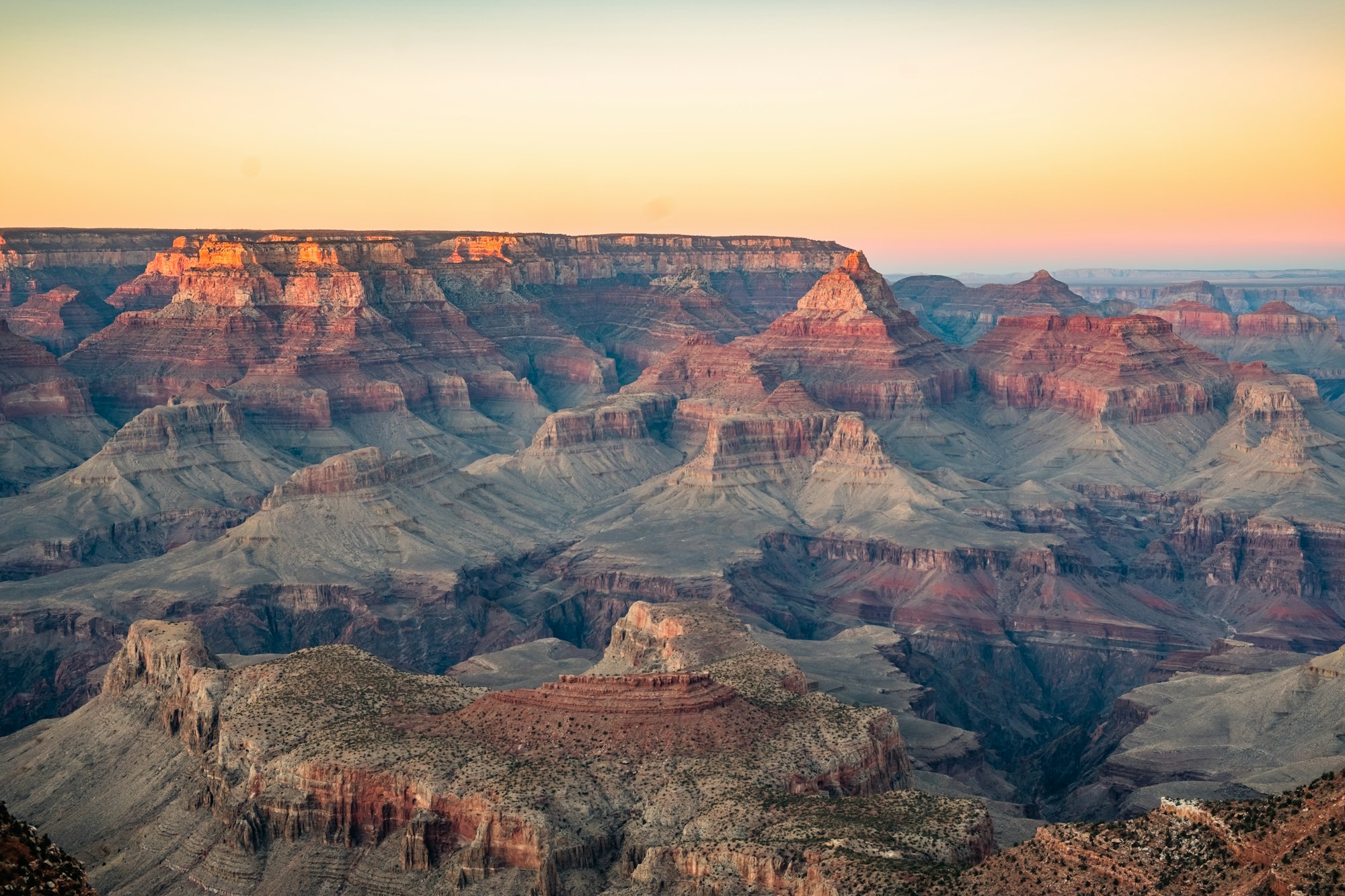Kay Ryan, "Blandeur"
...I’ve been to the Grand Canyon. What took me aback was how colorful it was. As if it were a source of rainbows within the Earth itself.

Greetings! A few thoughts
Right now, there's a debate playing among the political philosophy/pundit crowd: Is America a "nation" or an "idea?"
It's a debate which is actually pretty sickening, because one quick look at who is emphatic about the notion of "nation," and um, yeah.
This debate might be had in good faith if there were, I don't know, a lot fewer neo-Nazis looking for Tucker Carlson clones. But I know it can't be had in good faith right now.
I will have more to say about America as an idea in order to do justice to some of the rhetoric of the Founders that has stayed with us. But I don't intend that as a contribution to the "debate." It's more a "if you can't conceive of why America is an idea, here's a thought."
If you want to talk policy, I've learned so much reading David Dayen's Twitter and the reporting of The American Prospect. I can't recommend this edition of their "First 100" series enough. He lists a number of times the Biden administration has had to be pushed to do "leftist" things which are eminently reasonable and in little danger of being unpopular. It's a curious dynamic, and I wonder about it myself.
Kay Ryan, "Blandeur"
Kay Ryan’s “Blandeur” is a prayer that may seem strange to future generations. “If it please God, / let less happen.”
It’s a prayer I wouldn’t have understood five years ago.
Now, after a plague, economic and political catastrophes, a media obsessed with outrage, a citizenry prone to believe only the most outlandish conspiracy theories, I think I get it.
I think. I’m not sure.
Blandeur (from Poetry) Kay Ryan If it please God, let less happen. Even out Earth's rondure, flatten Eiger, blanden the Grand Canyon. Make valleys slightly higher, widen fissures to arable land, remand your terrible glaciers and silence their calving, halving or doubling all geographical features toward the mean. Unlean against our hearts. Withdraw your grandeur from these parts.
***
“Even out Earth’s / rondure, flatten / Eiger, blanden / the Grand Canyon.” These are not my demands. I’d like the January 6th insurrectionists to face serious charges. I’d like the Trump administration officials responsible for a culture of lawlessness to be prosecuted. I want justice and accountability; for me, this would be normalcy. The feeling that expectations matter, that the pain of others can be heard, that decency can be had.
Asking a monumental Alpine mountain to be flattened, or for the Grand Canyon to be made bland—these are peculiar wishes. They’re almost comical. Even out the curvature of the Earth? What makes it spectacular in photos from space? For that matter, I’ve been to the Grand Canyon. What took me aback was how colorful it was. As if it were a source of rainbows within the Earth itself.
I don’t think “Blandeur” is joking. I sound ridiculous and hysterical when in distress. And the distress of this poem can be identified.
***
Valleys are to be made “slightly higher,” glaciers should be admonished. “Widen fissures / to arable land” necessitates comment. Farmland exhausts water supplies, draining rivers and even groundwater. When too much groundwater is lost, the earth starts buckling and fissures swallow whatever is above. It’s a man-made tragedy caused by what many consider the most noble and natural art. An art which beckons to self-sufficiency and a wholesome life.

Now the prayer’s extremism makes more sense. “Remand your / terrible glaciers / and silence / their calving, / halving or doubling / all geographical features / toward the mean.” The grandeur of God, which gives us the wonder of geological time—e.g., the slow movement of a glacier carving out canyons and rivers—does not tell us anything about the moderation we require. We need to be moderate, but we are dazzled by terrible beauty all around. And we try to mimic the miraculous—we feed more than five thousand every day—and there are consequences we cannot foresee.
“Unlean against our hearts.” We need knowledge, and knowledge can start from what is knowable. Perhaps simpler things are easier to know. Perhaps with them we can live within measure.
***
The tragedy in happenings of the natural world applies via analogy to injustices social and political, but this is more a rough guideline than a truth. Carlos Maza has an important video essay about Camus’ “The Plague,” and he emphasizes how the plague itself and reactions to it demonstrate the sentiments and tendencies characteristic of fascism. Camus sees philosophical and moral issues with a clarity second-to-none. I don’t trust myself to spell out what’s at stake with a world easier to know, where environmental calamity may not happen as often.
I do think there are delusions of godhood within the body politic, but they’re not tied to the majesty of Eiger or the Grand Canyon. In fact, what’s striking about QAnon supporters or militant anti-vaxxers is the degree to which they manipulate religion. The want of a feeling of control dominates their behavior, and they often straddle a line between excessive self-pity and murderous rage. They want misinformation. They want the grandeur without the object to which it properly belongs. Maybe, with that said, I can somewhat endorse Ryan’s last lines: “Withdraw your grandeur / from these parts.” I don’t want the Grand Canyon to disappear. What I want is the car dealer saying racist things on Facebook to stop believing he is the sole defender of Western Civilization.
